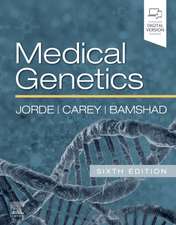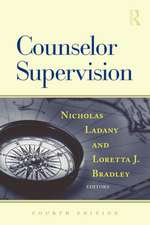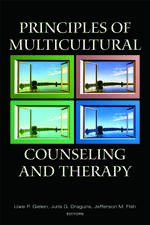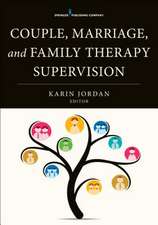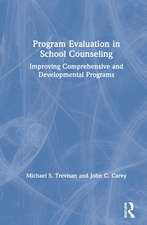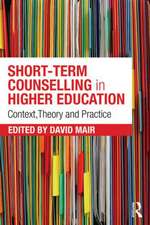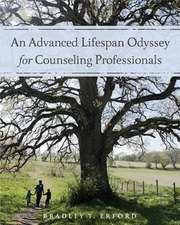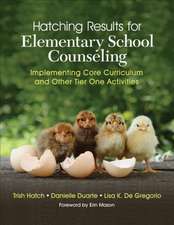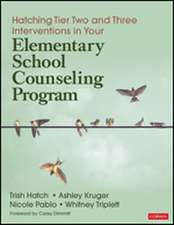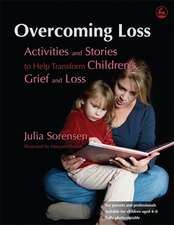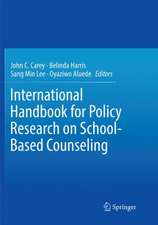Evidence-Based School Counseling: Making a Difference With Data-Driven Practices
Editat de Catherine L. Dimmitt, John C. Carey, Trish Hatchen Limba Engleză Paperback – 13 aug 2007
Preț: 311.82 lei
Nou
Puncte Express: 468
Preț estimativ în valută:
59.67€ • 62.30$ • 49.38£
59.67€ • 62.30$ • 49.38£
Carte tipărită la comandă
Livrare economică 04-18 aprilie
Preluare comenzi: 021 569.72.76
Specificații
ISBN-13: 9781412948906
ISBN-10: 1412948908
Pagini: 240
Ilustrații: illustrations
Dimensiuni: 178 x 254 x 14 mm
Greutate: 0.5 kg
Ediția:1
Editura: SAGE Publications
Colecția Corwin
Locul publicării:Thousand Oaks, United States
ISBN-10: 1412948908
Pagini: 240
Ilustrații: illustrations
Dimensiuni: 178 x 254 x 14 mm
Greutate: 0.5 kg
Ediția:1
Editura: SAGE Publications
Colecția Corwin
Locul publicării:Thousand Oaks, United States
Recenzii
"The dual scenarios at the beginning of each chapter give a great visual of what an evidence-based approach looks like."
"The move to evidence-based school counseling practice presents a daunting challenge, but the authors offer a sound argument as to why it must be met and then get busy explaining how to do what we need to do."
"School counselors and students of the profession receive specific guidelines and models for collecting and analyzing data, including tips on measuring student learning and behavior modification. An excellent guide counselors will appreciate."
"An utterly invaluable guide to measuring qualities and situations that would seem at first glance to deny quantification. Highly recommended for aspiring and working professionals in the field."
"What sets this book apart from its contemporaries is that it is both comprehensive and practical. The book is well written, well organized, and easy to read. It not only serves to educate but, equally important, to inspire change, innovation, and forward movement."
"An excellent contribution to the field of school counseling."
"The move to evidence-based school counseling practice presents a daunting challenge, but the authors offer a sound argument as to why it must be met and then get busy explaining how to do what we need to do."
"School counselors and students of the profession receive specific guidelines and models for collecting and analyzing data, including tips on measuring student learning and behavior modification. An excellent guide counselors will appreciate."
"An utterly invaluable guide to measuring qualities and situations that would seem at first glance to deny quantification. Highly recommended for aspiring and working professionals in the field."
"What sets this book apart from its contemporaries is that it is both comprehensive and practical. The book is well written, well organized, and easy to read. It not only serves to educate but, equally important, to inspire change, innovation, and forward movement."
"An excellent contribution to the field of school counseling."
Cuprins
Preface
Acknowledgments
About the Authors
1. Moving to Evidence-Based School Counseling Practice
Integrating Evidence and Practice
A Model for Evidence-Based School Counseling Practice
Evidence-Based School Counseling in the Context of the Reform Movement
School Counseling and Standards
School Counseling Reform
Summary
2. Data-Based Decision Making: Knowing What Needs to Be Addressed
Data-Based Decision Making and School Improvement
Data-Based Decision-Making Models
A General Model for Data-Based Decision Making
Enabling Conditions for Data-Based Decision Making
Summary
3. Practical Considerations in Using Data
Types of Data
Collecting, Analyzing, and Disaggregating Data
Developing Data-Based Action Plans
Creating an Action Plan With Evaluation in Mind: Using Process, Perception, and Results Data
Data Over Time
Summary
4. Choosing Interventions: Reading and Weighing Outcome Research
Why Are Research-Based School Counseling Interventions Important?
Becoming an Informed Consumer of Research
The Research Context
How Can School Counselors Find Interventions That Will Work?
Summary
5. Evaluating School Counseling Interventions and Programs
What Is Evaluation?
Programs and Interventions
Evaluating Interventions
Evaluating Programs
"Customer" Satisfaction
Using External Experts in School Counseling Reviews
Summary
Sample Intervention Evaluation Action Plan: Evaluation of Second Step Violence Prevention Curriculum (Fifth Grade)
6. Action Research and Collaborative Partnerships
What Is Action Research?
Action Research Partnerships
Why Conduct Action Research?
How to Conduct Action Research
Summary
7. Measuring Student Learning and Behavior Change
Types of Assessment
Measuring Student Learning Effectively
Using Existing Assessment Tools
Measuring Changes in Attitudes, Skills, and Knowledge
Developing Pre- and Posttests
Summary
Sample Learning Goals and Related Pre- and Posttest Questions
Sample Standards-Aligned Curriculum and Pre- and Posttests
Fifth Grade-Middle School Transition Lesson
8. Using Surveys to Gather Information
Using Existing Surveys
Survey Development
Summary
9. Moving to Evidence-Based School Counseling Practice
An Integrated Evidence-Based Proactive Approach
The Journey: Getting From Here to There
A Five-Year Plan
Reporting About Results to Enhance Legitimacy
Disseminating Results Effectively
The ASCA National Model and Results Reporting
Planning Your Ongoing Professional Skill Development
Reconstructing Professional Identity
Appendix A: Guidance Curriculum Action Plans, Intentional Guidance Action Plans, and a Needs Assessment Survey
Appendix B: Summary of School Counseling Outcome Research Articles and Findings
References
Index
Acknowledgments
About the Authors
1. Moving to Evidence-Based School Counseling Practice
Integrating Evidence and Practice
A Model for Evidence-Based School Counseling Practice
Evidence-Based School Counseling in the Context of the Reform Movement
School Counseling and Standards
School Counseling Reform
Summary
2. Data-Based Decision Making: Knowing What Needs to Be Addressed
Data-Based Decision Making and School Improvement
Data-Based Decision-Making Models
A General Model for Data-Based Decision Making
Enabling Conditions for Data-Based Decision Making
Summary
3. Practical Considerations in Using Data
Types of Data
Collecting, Analyzing, and Disaggregating Data
Developing Data-Based Action Plans
Creating an Action Plan With Evaluation in Mind: Using Process, Perception, and Results Data
Data Over Time
Summary
4. Choosing Interventions: Reading and Weighing Outcome Research
Why Are Research-Based School Counseling Interventions Important?
Becoming an Informed Consumer of Research
The Research Context
How Can School Counselors Find Interventions That Will Work?
Summary
5. Evaluating School Counseling Interventions and Programs
What Is Evaluation?
Programs and Interventions
Evaluating Interventions
Evaluating Programs
"Customer" Satisfaction
Using External Experts in School Counseling Reviews
Summary
Sample Intervention Evaluation Action Plan: Evaluation of Second Step Violence Prevention Curriculum (Fifth Grade)
6. Action Research and Collaborative Partnerships
What Is Action Research?
Action Research Partnerships
Why Conduct Action Research?
How to Conduct Action Research
Summary
7. Measuring Student Learning and Behavior Change
Types of Assessment
Measuring Student Learning Effectively
Using Existing Assessment Tools
Measuring Changes in Attitudes, Skills, and Knowledge
Developing Pre- and Posttests
Summary
Sample Learning Goals and Related Pre- and Posttest Questions
Sample Standards-Aligned Curriculum and Pre- and Posttests
Fifth Grade-Middle School Transition Lesson
8. Using Surveys to Gather Information
Using Existing Surveys
Survey Development
Summary
9. Moving to Evidence-Based School Counseling Practice
An Integrated Evidence-Based Proactive Approach
The Journey: Getting From Here to There
A Five-Year Plan
Reporting About Results to Enhance Legitimacy
Disseminating Results Effectively
The ASCA National Model and Results Reporting
Planning Your Ongoing Professional Skill Development
Reconstructing Professional Identity
Appendix A: Guidance Curriculum Action Plans, Intentional Guidance Action Plans, and a Needs Assessment Survey
Appendix B: Summary of School Counseling Outcome Research Articles and Findings
References
Index
Descriere
Measure the difference you make in students' academic, career, and personal/social development!
Aligned with the American School Counselor Association's National Model, this authoritative guide from highly respected counselor educators and trainers gives preservice and inservice counselors the tools to identify evidence-based practices in their field and to use data in designing, implementing, and evaluating programs and interventions. With vignettes and recommendations in every chapter, this book offers skill-building guidelines for:
Aligned with the American School Counselor Association's National Model, this authoritative guide from highly respected counselor educators and trainers gives preservice and inservice counselors the tools to identify evidence-based practices in their field and to use data in designing, implementing, and evaluating programs and interventions. With vignettes and recommendations in every chapter, this book offers skill-building guidelines for:
- Analyzing outcome research to inform planning
- Carrying out action research and building collaborative partnerships
- Measuring student learning and behavior change
- Communicating results to stakeholders, and more

